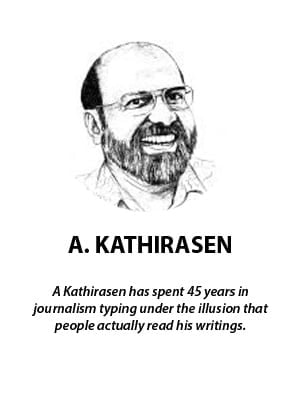
Inspector-General of Police Razarudin Husain has warned his men not to accept “ang pow” (red packets) while on duty.
“The act of receiving any form of cash while working is wrong as it could be questioned and connected to an element of corruption,” he said on Feb 7.
He noted, however, that: “If they are not working, then they can receive ang pow from friends or family members in conjunction with any celebration.”
That may be a problem.
But first, let me congratulate him for coming down hard on corruption in the ranks. I hope all his officers will support him in cleaning up the image of the police force.
It is in the interest of every policeman to win the trust of the public by not asking for or accepting bribes and not getting involved in criminal activities. Their job is to protect people and their properties.
Razarudin warned his men about accepting ang pow while on duty after a team from Bukit Aman’s integrity and standards compliance department found “wads of cash” in ang pow packets in the safe of a police station during a surprise check.
They also found ang pow packets on a sergeant at the police station. According to reports, the sergeant is suspected of having received cash of more than RM6,000 from business outlets in the vicinity of the station.
The public will certainly appreciate the good work of the police force in apprehending this man and also, separately, arresting a female police officer and seven rank-and-file personnel in Johor a day earlier for allegedly accepting RM35,000 as an inducement to release a suspect in a drug-related case.
Earlier, on Feb 4, Razarudin was reported to have said that low salaries and individual attitudes were among the reasons police officers and personnel were involved in corruption.
“I acknowledge that the (low) salary is one of the factors. For a constable whose salary, including any allowances, is RM2,500, he could be categorised as ‘urban poor’ if he is living in Kuala Lumpur.
“However, if he lives in Kuala Nerang (Kedah), Besut (Terengganu), Kinabatangan (Sabah) or Beluran (Sabah), then his salary is considered a lot. That’s one of the factors to be looked into,” he was quoted as saying.
However, he was quick to also note that some cases of corruption involved individuals with high incomes.
The problem is that the public expects policemen to be of high integrity, no matter what salary they receive, and rightly so. Otherwise, they should look for jobs elsewhere.
Those joining the police force should know how important its function is in any society, especially so in a democracy where the rule of law is upheld.
More must be done to change the attitude of policemen so that they place integrity above unethically or illegally acquired money.
Coming to the issue of celebrations, years ago I heard that quite a number of police officers would look forward to the Chinese New Year celebration.
This was because they would get ang pow from big businessmen, including those involved in vice or criminal activities, when visiting them.
I have heard of small groups of policemen visiting big towkays during Chinese New Year. After enjoying the food, they will get ang pow. The higher-ranking officers would get more, I was once told.
Often it was the wife of the towkay or some trusted aide who would pass the ang pow packets to the policemen who would be in mufti. The ang pow could be substantial if the businessmen felt he might have need of favours later or if he had already received a favour.
The fact is, this is not illegal and the ethics of it is debatable, as most if not all visitors get ang pow – especially so if they are unmarried.
I don’t know if this still happens today.
But if it does, there’s no way of stopping it unless the policemen themselves decide against accepting the ang pow.
One way of instilling in lower ranks the need for professionalism and high ethics is for senior officers to lead by example.
But it should not stop there. Senior civil servants, politicians and ministers, including those implementing the law, must also set good examples
If we want the ordinary policeman to change, the big boys must change first.
Can we expect the ordinary policeman to stay away from corruption if he sees senior civil servants or ministers or big shots enjoying the fruits of corruption?
Can we expect the ordinary policeman to stay away from corruption if he sees politicians and others amassing millions and yet getting special treatment upon getting caught?
Apart from those in positions of power setting good examples, there is also an urgent need for structural reform in governance.
The truth of the matter is that experts on the subject of corruption have spoken widely and written reams of papers on it. Our problem is not one of not knowing the cause or causes; our problem is one of lacking the will to act decisively and fairly. - FMT
The views expressed are those of the writer and do not necessarily reflect those of MMKtT.



No comments:
Post a Comment
Note: Only a member of this blog may post a comment.